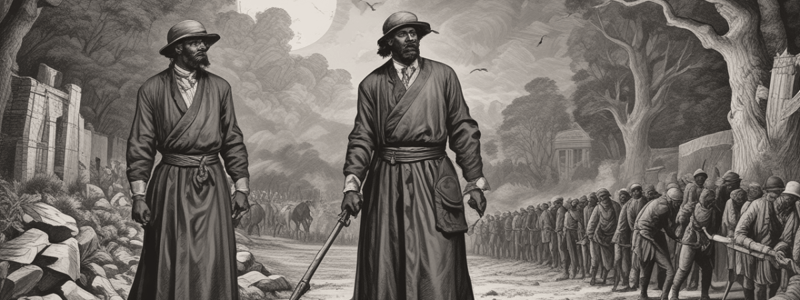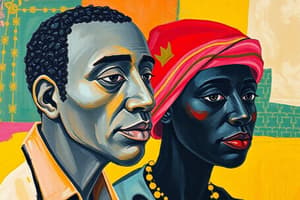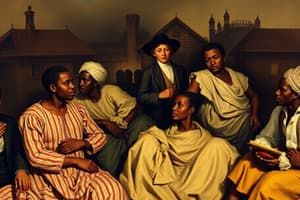Podcast
Questions and Answers
What was the main goal of the colonizationist movement in the early nineteenth century?
What was the main goal of the colonizationist movement in the early nineteenth century?
- To gradually end slavery in the United States by removing the free Black population from North America (correct)
- To promote social reform among middle-class evangelicals
- To appeal to the sense of Christian conscience of enslavers
- To immediately end slavery in the United States
Which of the following groups played a significant role in pushing the idea of immediate emancipation?
Which of the following groups played a significant role in pushing the idea of immediate emancipation?
- Colonizationist movement leaders
- European abolitionists
- Southern slave owners and politicians
- Northern free Black Americans and middle-class evangelicals (correct)
What strategy did the young abolitionists employ to convince enslavers to release their enslaved laborers?
What strategy did the young abolitionists employ to convince enslavers to release their enslaved laborers?
- Moral suasion (correct)
- Gradual emancipation
- Political activism
- Conditional emancipation
What was the expected outcome of the abolitionist movement's efforts?
What was the expected outcome of the abolitionist movement's efforts?
Who were some of the key figures in the abolitionist movement?
Who were some of the key figures in the abolitionist movement?
What was the primary reason why many evangelical reformers opposed slavery?
What was the primary reason why many evangelical reformers opposed slavery?
By the 1830s, what development had occurred in the abolitionist movement?
By the 1830s, what development had occurred in the abolitionist movement?
What was the alternative approach to immediate emancipation that had been previously employed?
What was the alternative approach to immediate emancipation that had been previously employed?
Flashcards are hidden until you start studying
Study Notes
Revivalist Doctrines and Abolition
- Revivalist doctrines of salvation, perfectionism, and disinterested benevolence led many evangelical reformers to believe that slavery was the most God-defying of all sins and the most terrible blight on the moral virtue of the United States.
Early Antislavery Efforts
- White interest in and commitment to abolition had existed for several decades before the 1830s.
- Organized antislavery advocacy was largely restricted to models of gradual emancipation (seen in several northern states following the American Revolution) and conditional emancipation (seen in colonization efforts to remove Black Americans to settlements in Africa).
Colonizationist Movement
- The colonizationist movement of the early nineteenth century drew together a broad political spectrum of Americans with its promise of gradually ending slavery in the United States by removing the free Black population from North America.
Radicalization of the Movement
- By the 1830s, a rising tide of anticolonization sentiment among northern free Black Americans and middle-class evangelicals’ flourishing commitment to social reform radicalized the movement.
- The radicalization led to the idea of immediate emancipation becoming a central part of northern reform agendas.
Key Abolitionists
- Baptists such as William Lloyd Garrison were key figures in the abolitionist movement.
- Congregational revivalists like Arthur and Lewis Tappan and Theodore Dwight Weld were also prominent abolitionists.
- Radical Quakers including Lucretia Mott and John Greenleaf Whittier were important figures in the movement.
Moral Suasion Strategy
- Abolitionists believed they could convince enslavers to voluntarily release their enslaved laborers by appealing to their sense of Christian conscience through a strategy known as “moral suasion.”
- The goal of moral suasion was to achieve national redemption and moral harmony.
Studying That Suits You
Use AI to generate personalized quizzes and flashcards to suit your learning preferences.




